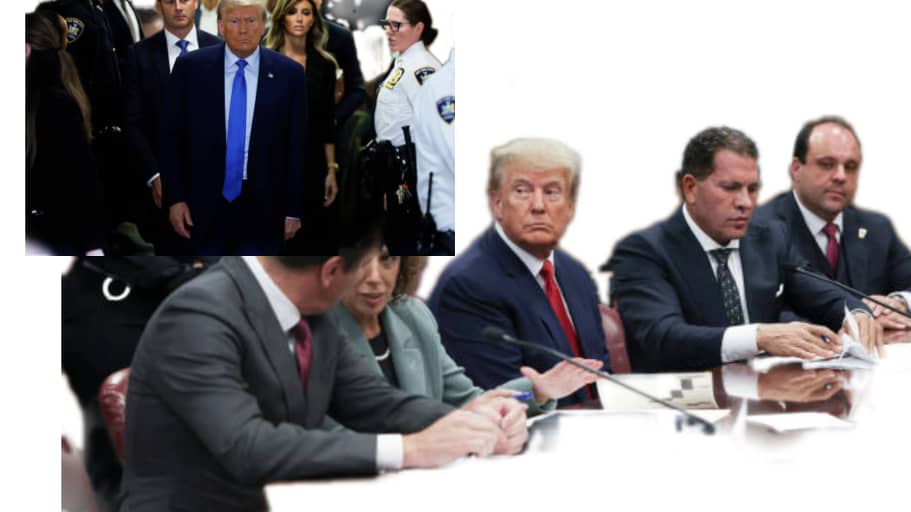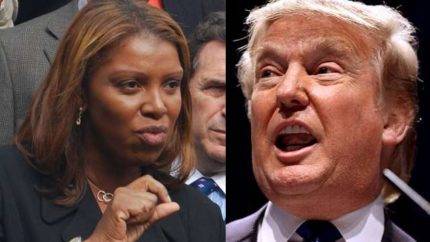In a shocking turn of events during his New York civil fraud trial, former President Trump Donald captivated the courtroom with a deranged and apocalyptic speech. Despite being barred from giving a formal closing argument, Trump disregarded the rules and unleashed a barrage of conspiracy theories and complaints. Judge Arthur Engoran attempted to rein in the chaos, asking Trump to strictly focus on the case. However, Trump’s response was a diatribe where he proclaimed innocence and accused New York Attorney General Letitia James of orchestrating a political vendetta against him.
The courtroom drama reached a surreal peak when Donald accused the judge of ignoring him and labeled the entire legal proceeding as a “fraud” against him. This bizarre episode left many observers astonished, questioning Trump’s approach and demeanor during a crucial moment in the $370 million lawsuit.
Trump’s Unsubstantiated Claims and Attacks on the Judiciary: A Legal Freefall
Despite being given limited time to speak, Donald continued his erratic performance by making unsubstantiated claims, including accusing Letitia James of personal animosity. The former president argued that the lawsuit was part of a larger conspiracy to prevent him from getting elected again, painting himself as the victim of a political vendetta. Such audacious statements drew criticism from both the judge and the public.

Judge Engoran’s efforts to maintain order included instructing the MAGA attorneys to control their client. The judge, unswayed by Trump’s theatrics, limited his speaking time, eventually cutting him off before adjourning for lunch. The subsequent absence of Trump during the closing remarks left a void, emphasizing the unusual and tumultuous nature of the trial.
Social Media Outcry: Public Displeasure Over Donald’s Behavior
The courtroom drama did not unfold in isolation, as social media platforms, especially X (formerly Twitter), became a battleground for public opinion. Vanessa Bestade, echoing the sentiments of many, expressed disappointment in Donald’s disregard for the law. She criticized his argument that falsifying financial statements had no victim, emphasizing that it is a crime violating a crucial law that upholds integrity in the business community.
Janet Par, a social media user, took a more critical stance, labeling Donald as the “ultimate narcissist” and highlighting his perceived traits of cravenness, selfishness, cruelty, and calculated behavior. Such reactions on social media underscored the widespread concern and disapproval of Donald’s conduct during the trial.

Legal Community Weighs In: Donald’s Performance Criticized for Lack of Respect
Within legal circles,Donald’s courtroom performance drew sharp criticism. Many legal experts and commentators questioned his lack of respect for the legal proceedings and the judiciary. The argument that Trump should be allowed to falsify financial statements was dismissed as both untrue and irrelevant to the case. The trial, intended to address allegations of civil fraud, became a spectacle that raised concerns about the former president’s approach to the rule of law. As the trial proceeded without Trump’s direct presence in the closing remarks, the legal community continued to reflect on the unprecedented nature of the proceedings.
Surviving the Ethical Storm
The press release hints at the resilience of Donald Trump in the face of ethical scrutiny. Survival in this context implies not only political survival but also the broader impact on his legacy. As society becomes increasingly conscientious about ethical leadership, Trump’s ability to navigate this ethical storm will undoubtedly influence how he is remembered by future generations. This revelation prompts a reflection on whether the former President’s actions were guided by a sense of ethical responsibility or if he indeed operated as a “wild beast” loosed upon the world, as per Camus’ poignant analogy.
Table of Contents
Discover more from OGM News NG
Subscribe to get the latest posts sent to your email.














